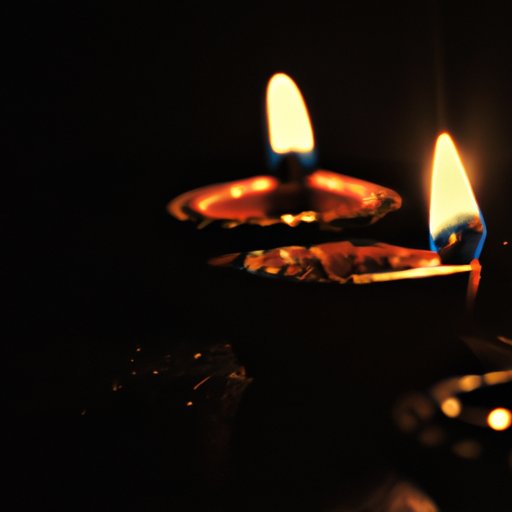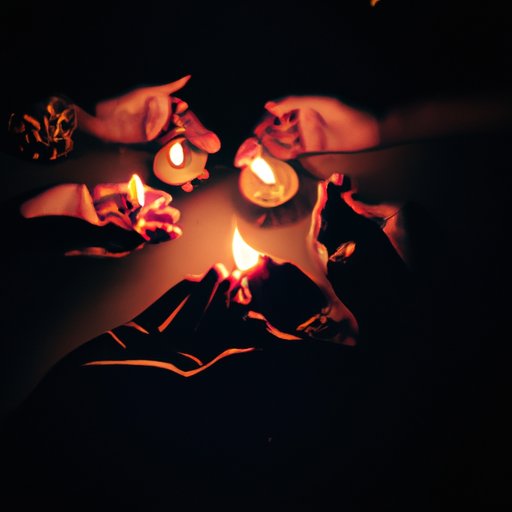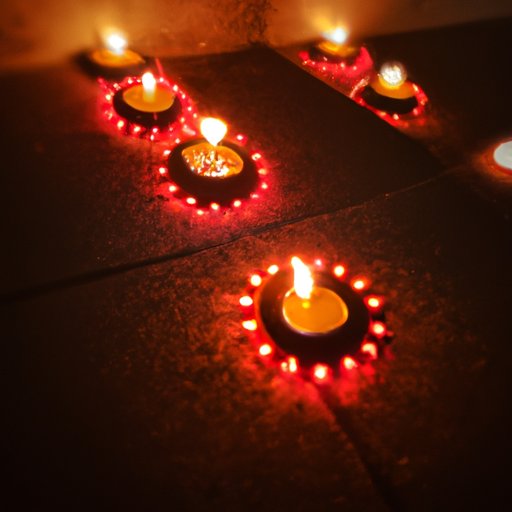Introduction
Diwali, also known as Deepavali, is an ancient Hindu festival that marks the beginning of the new year in many parts of India. The festival is celebrated with lights, fireworks, and sweets. It is believed to be the most important Hindu festival and is celebrated throughout India, as well as in countries such as Nepal, Sri Lanka, Malaysia, and Singapore. The word ‘Diwali’ is derived from the Sanskrit ‘Deepavali’, which means ‘row of lamps’.
The question of whether Diwali is religious or cultural has been debated for centuries. On one hand, Diwali is rooted in religious mythology and is associated with the victory of good over evil, light over darkness, and knowledge over ignorance. On the other hand, it is also a cultural event celebrated with feasts, decorations, and gift-giving. This article examines the religious and cultural aspects of Diwali and how they intertwine to create a vibrant celebration.

Examining Diwali Through the Lens of Religion and Culture
Different religions have different interpretations of Diwali. For Hindus, Diwali is a religious celebration of Lord Rama’s return to Ayodhya after his 14-year exile. It is also associated with Goddess Lakshmi, the goddess of wealth and prosperity. For Sikhs, Diwali celebrates the release of Guru Hargobind from Mughal captivity in 1619. Jains celebrate Diwali to mark the attainment of nirvana by Mahavira, the founder of Jainism. Buddhists celebrate Diwali to commemorate Buddha’s return from heaven, where he had gone to preach to his mother.
In addition to religious beliefs, Diwali is also associated with many cultural practices. Decorating the home with oil lamps or diyas is an integral part of Diwali celebrations. These lamps are lit to signify the victory of light over darkness. Fireworks and bursting crackers are also popular during Diwali. Sweets and gifts are exchanged among family and friends, and special feasts are prepared.

How Diwali Brings Together People of All Faiths
Despite their different interpretations of Diwali, people of all faiths come together to celebrate the festival. The convergence of religious and cultural traditions creates a unique atmosphere of harmony and joy. People of different backgrounds exchange sweets and gifts and share in the festivities. This brings about a sense of unity and understanding among people of different beliefs.
Diwali is also a time when people of different religions come together to help those less fortunate. Charitable donations are made to the poor and needy, and food is distributed to the homeless. This further highlights the importance of the festival in bringing people of different faiths together.
Exploring the Significance of Diwali
Diwali is much more than just a religious or cultural festival. It is a time to celebrate the triumph of good over evil, light over darkness, and knowledge over ignorance. It is a reminder of the power of faith and the strength of unity. It is a time to reflect on our spiritual journey and to renew our commitment to leading a life of goodness and love.
At its core, Diwali is about the intersection of religious and cultural traditions. It is a time when people of all faiths come together to celebrate the spirit of joy and peace. In doing so, we are reminded of the timeless values of compassion, kindness, and understanding.
Conclusion
Diwali is a vibrant and meaningful festival celebrated by people of all faiths. This article explored the religious and cultural aspects of Diwali and its significance to both religious and cultural traditions. We saw how different religions view Diwali and the cultural practices associated with it. We also discussed how Diwali brings together people of all faiths and the significance of the festival in uniting people of different beliefs.
Diwali is a time to rejoice in the victory of light over darkness and to celebrate the beauty of religious and cultural diversity. As we come together to celebrate this festival of lights, let us remember the timeless values of compassion, kindness, and understanding.
(Note: Is this article not meeting your expectations? Do you have knowledge or insights to share? Unlock new opportunities and expand your reach by joining our authors team. Click Registration to join us and share your expertise with our readers.)
